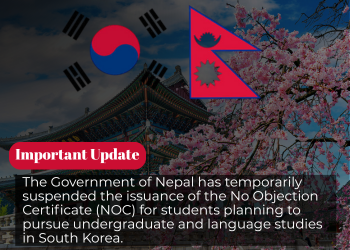
Studify International
 #NepalGovernment #Halted #NOC #D2Visa #D4Visa #InternationalStudnets #SouthKorea
#NepalGovernment #Halted #NOC #D2Visa #D4Visa #InternationalStudnets #SouthKorea
 0 comment
0 comment
 25 May, 2025
25 May, 2025

Introduction
In a surprising move, the Government of Nepal has temporarily suspended the issuance of the No Objection Certificate (NOC) for students planning to pursue undergraduate and language studies in South Korea. This decision, which took effect from Baishakh 28, 2082 (May 10, 2025), has sparked concerns among aspiring students and educational consultancies alike.
Why Has
the NOC Been Suspended?
The Ministry
of Education, Science, and Technology (MoEST) outlined several reasons
for this temporary halt:
·
Misuse
of Student Visas:
Many students were found to be prioritizing part-time employment over
academics, compromising the purpose of their studies.
·
Low
Academic Standards: A
significant number of students enrolled in institutions that did not meet
adequate academic criteria or provided insufficient study hours.
·
Mental
Health Concerns:
Reports indicated rising levels of depression and anxiety among
students, especially those struggling to find employment while studying.
·
Blacklisted
Institutions: Some
students were admitted to universities flagged by South Korean
authorities for non-compliance, raising serious concerns about the quality
and legitimacy of the education being offered.
Furthermore, the Nepali Embassy in South Korea highlighted that some students, after completing language courses, moved on to enroll in institutions listed on Korea’s “blacklist,” further aggravating the situation.
Who Is
Affected?
The
suspension mainly impacts:
·
Language
Course Students (D-4 Visa) –
Students intending to study Korean language in South Korea.
·
Undergraduate
Students (D-2 Visa) –
Especially those with limited qualifications or insufficient Korean language
proficiency.
However, it’s important to note that postgraduate programs and students with strong academic credentials and language proficiency are not currently affected. The government has also clarified that NOCs for students with IELTS or equivalent Korean language skills remain valid for now.
What’s
Next?
The Ministry of Education, Science and Technology (MoEST) has formed a special task force, headed by the Higher Education Division, to investigate an issue further in South Korea. This task force is tasked with looking into issues related to higher education, such as the rapid expansion of universities, the government's policies on university evaluations, and the impact of these policies on the development and changes within higher education institutions.
Here's a
more detailed look at what the MoEST is involved in:
· University Evaluations:
The MoEST regularly
evaluates universities and provides government-funded projects.
· Policy Implementation:
All national, public,
and private universities in South Korea are expected to follow the policies set
by the MoE.
· Centralized Decision-Making:
The MoE plays a
central role in the reform of the national higher education system, determining
the direction of development and change for all higher education institutions.
· Financial Incentives and Penalties:
Universities that do
not follow MoE policies may face exclusion from future government support,
highlighting the MoE's power and influence.
Conclusion
The temporary
halt on NOC issuance for certain categories of students heading to
South Korea is a clear message from the Government of
Nepal: student safety, academic integrity, and well-being come
first. While the decision may pose immediate challenges, it also presents
an opportunity to restructure and regulate the system
for more sustainable and beneficial educational pathways.
For
now, students, parents, and consultancies should remain
vigilant, stay informed through official channels, and be prepared
to adapt to upcoming changes.
Studify International
0 comment